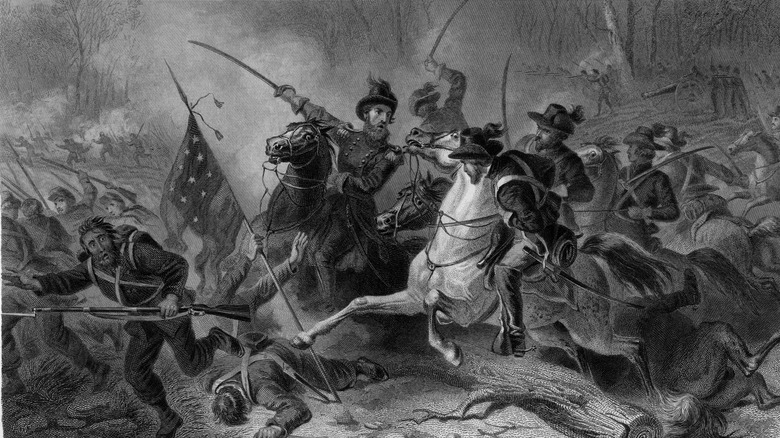The Phrase Meeting A Deadline Has A Much More Violent Origin Than You Thought
The word deadline has been used so frequently and (relatively) innocuously that you may not notice the reference to death. Today, a deadline simply means a due date (or time) for school, work, voter registration, and so on. You may get a poor grade or see yourself fired if you miss enough of them, but you'll probably still be alive when the dust settles. That isn't so for the original use of the word.
The study of the origins and evolution of words is called etymology, and it is through this study that we know many terms we use today have their roots in death. For instance, "mortal," "morgue," and even "mortgage" derive from the Latin "mort," meaning death (via Word Reference). Mortgage comes from 14th century Europe and means "dead pledge," because when you paid off your property (or if you failed to make payments) the agreement ended for good (via Online Etymology Dictionary).
Deadline, however, is a much younger term that originated during the American Civil War.
The prisoner's dilemma
Civil War soldiers who were taken prisoner were kept under control with a "dead line." According to Merriam-Webster, a line was marked on the ground around makeshift prisons, and anyone who crossed it would be shot. The line came in the form of ditches, fences, or other markers that were not intended to be serious physical barriers to escape. If one lacked high, impenetrable walls after battles where enemy soldiers were captured, a dead line would have to do.
"Before noon we were turned into the pen which is merely enclosed by a ditch and the dirt taken from the ditch thrown up on the outside, making a sort of breastwork," captured soldier Robert Ransom wrote in 1863, according to Merriam-Webster. "The ditch serves as a dead line, and no prisoners must go near the ditch." Some crossed the dead line in attempts to escape, but others did so as a means of suicide, unable to bear the horrific conditions in some camps. The trial of a Confederate leader from the infamous prison at Andersonville, Georgia, whose deadlines were either boards on the ground or simply imaginary lines, did much to popularize the term (via Mental Floss). But when did deadline come to have its modern connotation?
From war to the newsroom
The Online Etymology Dictionary says that by 1920, deadline was used in newsrooms in the manner most are familiar with today. This is interesting, because news reports in 1864 played a role in disseminating the term to the public, usually in stories about the Andersonville, Georgia, prison (via Merriam-Webster). The precise details of how the word came to be used as it is today cannot be known, but it's easy enough to imagine. The press needs its stories by a certain time to go to print, a hard stop, and one can envision an editor or writer somewhere joking that anyone who crossed that line, who was late with a story, would be shot. After this new term for due date (or time) took root in newsrooms, it spread to schools, businesses, and everywhere else.
Deadlines today may not provoke the same fear and submission that comes from potentially being gunned down, but they do create stress that reduces procrastination and supercharges performance (via The Guardian).


